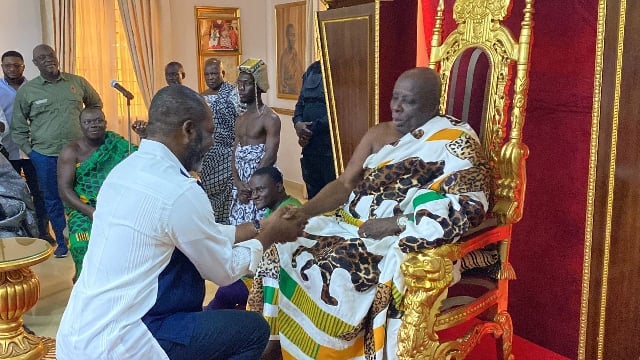The Okyenhene, Osagyefuo Amoatia Ofori Panin, has recently highlighted the urgent need for rural development in Ghana. During a courtesy visit from Dr. Mathew Opoku Prempeh, the New Patriotic Party (NPP) running mate, Okyenhene pointed out the significant contributions of local farmers and businesses to the nation’s overall progress. His call for increased attention to rural development comes amidst a backdrop of the government’s broader initiatives aimed at growth, stressing that balanced development across the nation is vital. The Okyenhene’s comments suggest a clear alignment of rural development with national prosperity, urging that development projects should not be confined to urban areas but expanded to include rural regions, which often suffer from a lack of essential infrastructure and resources.
In commending Dr. Opoku Prempeh for his instrumental role in the implementation of the Free Senior High School (Free SHS) policy—an initiative that has garnered international recognition—Okyenhene further articulated the disparities present in rural communities. He pointed out that such areas typically lack the critical infrastructure necessary for fostering development. His advocacy for enhanced decentralization underscores a belief that empowering local governance structures and improving supervision can create job opportunities and stimulate economic growth within these underserved regions. By focusing on key local issues and resources, the Okyenhene believes that rural development can serve as a catalyst for more inclusive economic growth, thus ensuring that the benefits of national development extend to all corners of the country.
Moreover, Osagyefuo Amoatia Ofori Panin urged Ghanaians to take ownership of their resources, reinforcing the idea that active community participation is essential for the country’s development. He called for collective responsibility, highlighting that sustainable growth can only be achieved through a concerted effort by all citizens. The emphasis on ownership speaks to a desire for empowerment among rural populations, suggesting that when individuals feel responsible for their resources, they are more likely to invest in their communities and advocate for necessary changes. The Okyenhene’s message is clear: without grassroots involvement, the push for development may falter, particularly in areas that have traditionally been overlooked.
Appreciating Dr. Opoku Prempeh’s humility and dedication, Osagyefuo Amoatia Ofori Panin acknowledged the broader implications of the Free SHS policy, referring to it as a transformative initiative for Ghanaians. While chiefs like the Okyenhene are prohibited from engaging in partisan politics, he emphasized his unwavering support for leaders who prioritize the country’s welfare over political gamesmanship. His remarks reflect a belief in the importance of ethical leadership and demonstrate a willingness to support initiatives that lead to substantial benefits for the nation, irrespective of political affiliation.
Dr. Mathew Opoku Prempeh reciprocated the Okyenhene’s sentiments by expressing profound respect for the traditional leader, whom he described as a father figure and a wellspring of wisdom. In reflecting on his role in the Free SHS policy’s implementation, he drew attention to pivotal discussions with President Nana Addo Dankwa Akufo-Addo, framing these conversations as critical in shaping the educational landscape. He noted the initial skepticism surrounding the policy but maintained that its potential impact could have been realized earlier had circumstances been different, implying a desire for opportunities to be maximized for the benefit of the populace.
Overall, the dialogue between the Okyenhene and Dr. Opoku Prempeh emphasizes a shared vision for Ghana’s future that champions rural development as integral to national growth. It underscores the need for strategic investments in rural infrastructure and local governance, coupled with community engagement, to foster sustainable progress. The collaboration between traditional leaders and political figures, illustrated in this exchange, is crucial for addressing the disparities between urban and rural areas, ultimately paving the way for a more balanced and equitable development strategy in Ghana.














